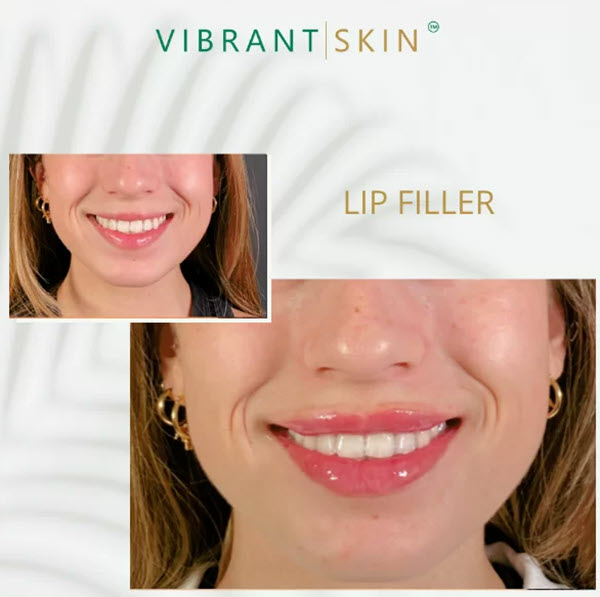Having full lips, firm cheeks, and smooth, youthful skin no longer needs to remain a fantasy. Today, people can quickly achieve these beauty goals thanks to the invention of dermal fillers - an affordable, walk-in cosmetic procedure.
This article explains what dermal fillers are, how they work, what results to expect, and how long they last.

What Are Dermal Fillers?
Dermal fillers are cosmetic injectables containing a gel-like substance. Medical providers inject them directly under the patient’s skin to provide volume to thinning, sagging skin and fill in wrinkles and folds.
Fillers are sometimes mistaken for Botox. Though both are injectables, Botox and fillers have distinct roles and address different cosmetic concerns. Botox eliminates wrinkles caused by dynamic muscles in the upper and lower facial region, while dermal fillers treat wrinkles and sagging skin caused by volume loss in the fat pads, bone and skin.
The first injectable filler for cosmetic purposes was bovine collagen, and the FDA approved it in 1981. Since then, many collagen-based injectables have been developed to treat aesthetic and medical concerns.
For aesthetic purposes, bovine and other animal collagens aren’t ideal. They are foreign to the human body, often causing unwanted reactions. The cosmetic industry came up with a safer filler made from a compound that naturally occurs in the body – hyaluronic acid (HA).
The first HA-based filler, Restylane, was approved in 2003. There are several varieties of biocompatible filler types today, but bovine collagen is still used in permanent fillers and those used for medical purposes.
Types of Dermal Fillers
Dermal fillers can be temporary and permanent. The FDA approved three temporary and one permanent Restylane, was approved in 2003. There are several varieties of biocompatible filler types dermal filler type.
Temporary Fillers
Temporary fillers are made from materials that the body degrades and absorbs.
- Hyaluronic acid (HA) – HA is a naturally occurring sugar compound with a high capacity for water retention, enabling it to bind water molecules under the skin and plump up the treatment area. It also extensively hydrates the skin, helping to minimize wrinkles. FDA-approved HA dermal fillers include Restylane, Juvéderm, Belotero Balance, and Revanesse Versa.
- Poly-L-lactic acid (PLLA) – PLLA is a synthetic substance that stimulates collagen production by triggering the body’s natural healing mechanism. It provides gradual and long-lasting results. Sculptra is the FDA-approved PLLA dermal filler.
- Calcium hydroxylapatite (CaHa) – CaHa is a synthetic substance similar to the calcium present in our bones and teeth. Fillers with CaHa microspheres suspended in gel increase collagen production, gradually volumizing the treated areas. Radiesse is the FDA-approved calcium hydroxylapatite dermal filler.
Permanent Fillers
Permanent fillers are made from non-absorbable substances, and they are longer lasting than temporary fillers but may cause more dramatic adverse reactions.
- Polymethylmethacrylate (PMMA) – This filler contains synthetic PMMA beads suspended in a solution made with bovine collagen. PMMA beads and collagen provide structure and support to the skin, lifting and volumizing it. Bellafill is the only FDA-approved PMMA dermal filler.
What Are Dermal Fillers Used For?
Dermal fillers address aging signs caused by collagen decline. As collagen fibers degrade, the skin loses its structural support and begins to thin, sag, and wrinkle. Fillers can help enhance:
- Thinning skin
- Loss of skin elasticity and firmness
- Moderate to severe facial wrinkles
- Skin folds
They can also help with aesthetic concerns not related to aging, such as:
- Asymmetrical features
- Acne scars
- Thin lips
Note: Learn about the differences between a lip flip and lip fillers.
Dermal Fillers Target Areas
Dermal fillers are a versatile cosmetic treatment targeting various skin issues. Each filler type is indicated for specific areas. Depending on the filler, a patient can reduce or enhance:
- Under-eye hollows
- Wrinkles around the mouth
- Sunken cheeks
- Nasolabial folds
- Marionette lines
- Laugh lines
- Weak, wrinkled chin
- Sagging jowls
- Wrinkled hands
Fillers can also be used in off-label procedures to improve forehead wrinkles, loose skin on the arms and legs, cellulite, and hip dips.
How to Prepare for Dermal Fillers?
Preparing for dermal fillers starts with choosing an experienced, reputable medical provider with a track record of successful treatments and satisfied clients. The patient schedules a consultation during which the medical provider examines the patient’s skin, reviews their medical history, and discusses their desired outcome.
The provider explains what to do before the treatment and how to behave afterward. Patients may be advised to:
- Discontinue the use of certain medications and supplements (e.g., blood thinners).
- Refrain from alcohol for several days.
- Avoid harsh cosmetic treatments, such as chemical peels and laser treatments, for several weeks.
- Use gentle skincare products.
What Can You Expect During Dermal Fillers Procedure?
Dermal fillers like Juvéderm and Restylane contain lidocaine to prevent pain during the treatment. However, many medical providers also apply numbing cream to further decrease potential discomfort.
The medical provider marks the injection site with a special marker and injects the filler along the marked dots. Patients report feeling mild pressure and stinging when the needle punctures the skin but no pain.
The provider gently massages the area after the injection to evenly distribute the filler. The treatment typically lasts under 30 minutes. There is no downtime, and the patients can resume their daily activities.
Note: First-time patients often wonder how much pain they’ll feel during the treatment. Read our blog post on whether fillers hurt for more details.
Dermal Fillers Results

Hyaluronic acid fillers provide immediate results. The patient’s skin is visibly plumper and smoother right away, but the full effects can only be seen after the swelling and bruising subside – usually within two weeks.
Collagen-stimulating fillers provide gradual results because it takes time to increase collagen production and plump up the skin. Patients can expect to see the first results after several weeks.
Patients who are unhappy with the results can reverse the procedure by getting them dissolved with hyaluronidase.
How Long Does a Dermal Filler Last?
The longevity of dermal filler results depends on the filler type, the severity of aging signs, and how the patient cares for their skin post-treatment.
According to the manufacturers, HA-based fillers last six to 12 months, while collagen-stimulating fillers can last up to two years. Permanent fillers may last up to five years.
Sometimes, patients manage to prolong the effects of the treatment by strictly adhering to aftercare tips – avoiding the sun, refraining from alcohol and junk foods, and using high-quality, nourishing skincare products.
Dermal Filler Aftercare
Dermal filler providers advise patients to adhere to these dermal filler aftercare guidelines after the treatment.
DOS:
- Take pain relievers if necessary (e.g., acetaminophen).
- Drink a lot of water.
- Sleep with an extra pillow.
- Use gentle skincare products.
DON’TS:
- Avoid strenuous exercise.
- Refrain from alcohol.
- Don’t rub or apply pressure on the treated area.
- Avoid exposure to sun and high heat.
Dermal Fillers Side Effects
Dermal fillers are safe and generally well tolerated. Most patients experience no side effects or only mild symptoms that quickly go away on their own.
Mild, common side effects include:
- Bruising
- Swelling
- Redness
- Itching
- Pain
Rare, more severe complications include:
- Asymmetrical features
- Scarring
- Infection
- Allergic reactions
- Tissue death
- Vision problems
Note: For the full list of potential side effects from the treatment and tips on how to prevent or resolve them, read our blog post on filler side effects.
When Should You See a Doctor?
Common side effects like redness, bruising, and swelling will resolve on their own within two weeks.
Contact your healthcare provider if you experience prolonged and more severe reactions, such as severe pain, headaches, muscle weakness, and other symptoms that interfere with your daily life.
Do Fillers Ruin Your Face?
Fillers are designed to enhance facial features. In the hands of a skilled medical practitioner, a dermal filler visibly improves and rejuvenates the patient’s appearance.
However, in some cases, fillers radically alter the patient’s natural appearance by excessively volumizing their lips, oversizing their jaw or cheeks, and creating a bloated look. This usually happens when an inexperienced provider uses too much filler or injects it at an inadequate depth.
To avoid fillers going wrong, make sure to schedule your treatment with board-certified medical specialists with extensive experience injecting dermal fillers.
Which Dermal Filler Should You Choose?
Medical providers choose the dermal filler for each patient depending on their aesthetic concerns and the target injection area. For example, they may recommend Juvéderm Volbella, Restylane Silk, or Revanesse Versa for patients who want to improve their under-eye area, fill in hollows, and reduce wrinkles.
Hyaluronic acid is frequently used for lip augmentation. The two most popular brands of hyaluronic acid lip fillers are Juvéderm Volbella and Restylane-L.
Patients who want to enhance their cheeks or chin often use fillers with a thicker consistency, such as Restylane Lyft or Juvéderm Voluma.
To soften nasolabial folds or marionette lines, providers choose fillers with flexibility and tissue integration, such as Restylane Refyne or Juvéderm Vollure.
Discuss all options with your provider to find the best solution for your needs.
Conclusion
Dermal fillers restore facial volume, provide sensually full lips, and smooth the skin. They provide long-lasting results and rarely cause adverse effects.
If you're planning on getting dermal fillers in the Phoenix area, contact and schedule a consultation at Vibrant Skin Bar. Our skin experts are more than happy to discuss treatment options with you and develop a treatment plan that will help you achieve your desired look.


